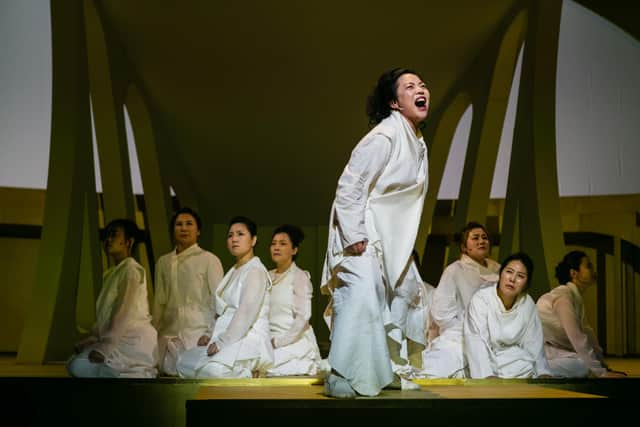Edinburgh International Festival theatre and music reviews: Trojan Women | Budapest Festival Orchestra: Bartók & Kodály | Emmanuel Ceysson & Friends
Trojan Women ****
Edinburgh Festival Theatre until 11 August
At a time when there is much talk about foregrounding women’s voices, Euripides’ play about the immediate aftermath of the fall of Troy takes on a fresh, raw energy in this Korean production. As the leading women of Troy wait to be taken away to become slaves and concubines, there is no ignoring the parallel with the ‘comfort women’ of the Korean war.
Singaporean director Ong Keng San takes the 20th-century changgeuk form back to its roots in the centuries-old pansori tradition with soliloquies scored by pansori legend Ahn Sook-sun. In each, the voice is paired with a single traditional instrument, and the form seems ideally suited to lamentation, creating a sound which ululates with pain and rage.
Advertisement
Hide AdHecuba (Kim Kum-mi), deposed queen of Troy, becomes magisterial in her grief and despair. Her prophetess daughter Cassandra (Yi So-yeon) is fiesty and defiant, having seen what lies ahead for the victors, while daughter-in-law Andromache (Kim Mi-jin) laments the loss of her baby son Astyanax, the last heir to the throne of Troy.
The contemporary language of playwright Bae Sam-sik’s adaptation is matched by a more modern k-pop-influenced musical style for the all-female chorus and Helen of Troy, who is voiced by a man, Kim Jun-soo. His mellow, sultry tenor, accompanied on piano, sets Helen apart from the river of grief, deemed in part culpable for the war, and still pursuing her lover, Menelaus (Choi Ho-sung).
Cho Myung-hee’s impressive set is part Greek amphitheatre, part modern temple, at times becoming the backdrop for elemental video projection which fills the stage with water, fire and cloud. As an unflinching study of loss and despair, Trojan women is never going to make easy watching, but the pansori form, combined with these tremendous voices, seems ideally suited to expressing grief for which there is no remedy.


Susan Mansfield
Budapest Festival Orchestra: Bartók & Kodály *****
Usher Hall
After exposing some of the inner workings of the phenomenon that is an orchestra on Tuesday, conductor Ivan Fischer was back at the Usher Hall the following evening with his Budapest Festival Orchestra in full, resplendent glory.
As a prelude, however, the orchestral players were in listening mode as three of their colleagues played with unpretentious authenticity the original versions of the folk songs which were to become Bartok’s Romanian Dances. In their more sanitised symphonic version, the BFO’s homogenous string sound caught and carried forward the spirit of whirling celebration, reaching into the heart of the music’s driving rhythms.
With fellow Hungarian András Schiff a distinguished soloist for the same composer’s Piano Concerto No 3, the only non-Magyars on stage were the 70+ voices of the NYCOS National Girls Choir. Singing Bartok’s Seven Choruses for Female Voice, Choir and Orchestra in Hungarian, from memory, with flawless precision was testimony to the rigour of their training. That they also sounded joyous, innocent, humorous or melancholy as the texts demanded of them was what makes this choir extra special.
Advertisement
Hide AdTo finish, Kodály’s Dances of Galánta was an unblemished feast of shimmering, sensual lusciousness, with solo clarinet setting much of the exotic scene.
Carol Main
Emmanuel Ceysson & Friends ****
Queen’s Hall
Superhero of the harp, Emmanuel Ceysson brought not only friends but what was verging on too much of a good thing to the Queen’s Hall on Thursday morning.
Advertisement
Hide AdWith six sizeable different pieces showcasing the instrument as solo and in ensemble, his programme not only overran its timing practically but was jam-packed with a huge amount of music. All French, each composer showed off the instrument itself centre-stage but also Ceysson’s formidable skill and dexterity in playing it. Glissandi and arpeggios running up and down the harp strings abounded in the solo pieces, most notably the dreamy Sonatine Op 30 by Marcel Tournier.
With Ceysson’s sparkly shoes and matching red soles highlighting his pedal work, they were especially befitting for Conte Fantastique, ‘Le Masque de la Mort Rouge’ by André Caplet for harp and string quartet. A gothic horror suspense story, it was curiously emotionally vacuous, although superbly performed by the group with the quartet hushed or punchily incisive as Edgar Allen Poe’s tale of death dictated.
Joined by flute and clarinet for Ravel’s Introduction and Allegro, the consistent balance of the ensemble sound perhaps inevitably loosened but the music’s deep and infinite beauty was undisputable.
Carol Main